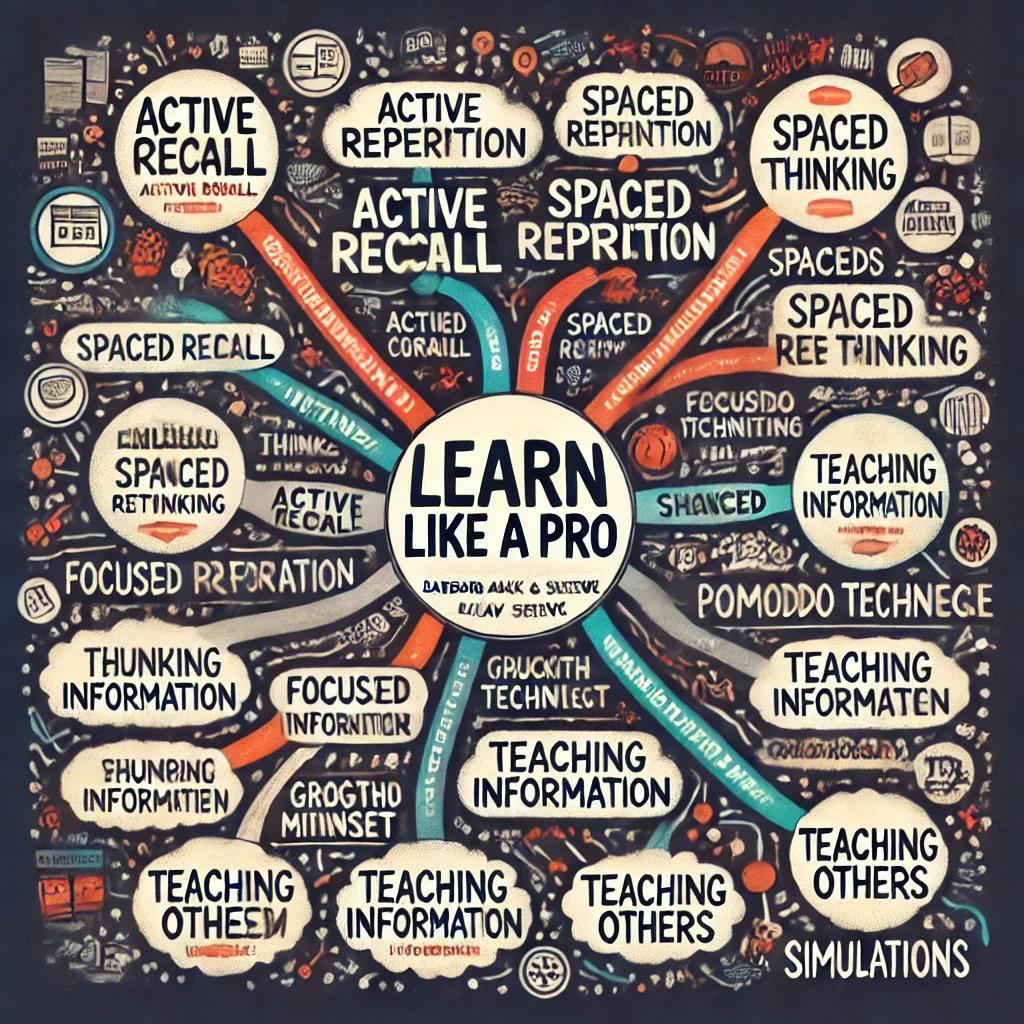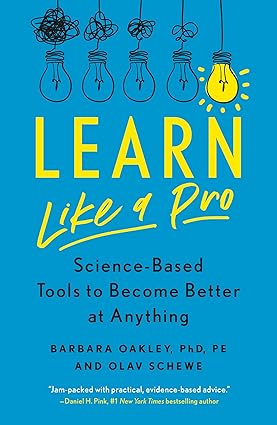White Paper: Learn Like a Pro - Strategies for Effective Learning
Introduction
Learning is a cornerstone of personal and professional growth in today’s fast-paced and ever-evolving world. Whether acquiring new technical skills, mastering a foreign language, or pursuing lifelong learning, adopting effective strategies can significantly enhance your learning process. This white paper explores proven methodologies from "Learn Like a Pro" by Barbara Oakley and Olav Schewe, supplemented with insights from academic research and practical applications.
The Science of Learning
Learning effectively involves understanding how the brain processes and retains information. Key principles include:
- Active Recall and Spaced Repetition
- Active recall involves actively retrieving information from memory rather than passively rereading or reviewing notes. This strengthens memory retention and improves understanding.
- Spaced repetition involves revisiting material at increasing intervals, leveraging the spacing effect to consolidate long-term memory.
- Focused and Diffuse Modes of Thinking
- The brain alternates between focused mode (intense concentration) and diffuse mode (relaxed, creative thinking). Balancing these modes can enhance problem-solving and creativity.
- Chunking Information
- Grouping related pieces of information into "chunks" enables better understanding and recall. This strategy is particularly effective for learning complex topics.
Strategies for Learning Like a Pro
- Set Clear Goals Define specific, measurable, and achievable goals for your learning journey. Breaking larger objectives into smaller milestones ensures steady progress.
- Adopt Active Learning Techniques
- Take notes by hand to synthesize information.
- Teach others what you’ve learned to reinforce understanding.
- Engage in practical exercises or simulations to apply theoretical knowledge.
- Use the Pomodoro Technique
- Study in short, focused bursts (25 minutes) followed by 5-minute breaks. This prevents mental fatigue and maintains motivation.
- Leverage Technology
- Use apps like Anki for spaced repetition.
- Explore online learning platforms like Coursera, Udemy, and edX for diverse learning resources.
- Employ AI tools like ChatGPT for clarifying doubts and generating ideas.
- Develop a Growth Mindset
- Embrace challenges and view failures as opportunities to learn. Carol Dweck’s research on growth mindset emphasizes the importance of resilience and persistence in mastering new skills.
Practical Use Cases
- Technical Skills Development
- Software engineers can use spaced repetition to memorize syntax and algorithms.
- IT professionals can employ hands-on projects to build real-world experience.
- Language Learning
- Pair active recall with language apps like Duolingo.
- Practice conversational skills with native speakers or AI tools.
- Exam Preparation
- Use active recall for mastering key concepts.
- Create a study schedule incorporating spaced repetition.
- Corporate Training
- Facilitate learning through interactive workshops and simulations.
- Implement microlearning modules for bite-sized, easily digestible content.
- Scientific Research and Development
- Scientists can use focused and diffuse modes of thinking to brainstorm hypotheses and analyze data.
- Chunking enables better organization of complex research methodologies.
- Spaced repetition helps in retaining intricate details of scientific papers and experimental protocols.
- Engineering Problem-Solving
- Active recall supports mastering mathematical models, formulas, and technical schematics.
- Engineers can use simulations and project-based learning to apply theoretical principles to real-world scenarios.
- The Pomodoro Technique can help maintain focus during long problem-solving sessions or CAD (Computer-Aided Design) modeling tasks.
Expanded Use Cases for Scientists and Engineers
- For Scientists:
- Analyzing Research Papers: Using active recall to summarize key points from journals and identify gaps in current research.
- Experiment Planning: Applying the growth mindset to design experiments, addressing failures as learning opportunities.
- Data Analysis: Leveraging chunking to break down large datasets into manageable segments for easier analysis.
- Collaborative Learning: Using peer teaching to discuss theories and methodologies with colleagues, reinforcing comprehension.
- For Engineers:
- Design Optimization: Employing focused and diffuse thinking modes to tackle complex engineering designs.
- Skill Development: Using spaced repetition to master new technologies like IoT systems, robotics, or advanced manufacturing techniques.
- Project Management: Utilizing Pomodoro sessions to structure work on large engineering projects, ensuring consistent progress.
- Simulation Training: Engaging in hands-on simulations or software tools like MATLAB, Simulink, or AutoCAD to solidify theoretical knowledge through practical application.
Challenges and Solutions
- Procrastination
- Solution: Break tasks into smaller, manageable parts and use tools like Habitica to gamify learning.
- Overwhelming Content
- Solution: Prioritize topics using the Pareto Principle (80/20 rule).
- Lack of Motivation
- Solution: Find a study partner or join online communities for accountability.
Conclusion
Adopting effective learning strategies can unlock your potential and accelerate personal and professional growth. By integrating principles from "Learn Like a Pro," leveraging technology, and maintaining a growth mindset, you can transform your approach to learning and achieve extraordinary results. Scientists and engineers, in particular, can use these strategies to advance innovation, solve complex problems, and stay ahead in their respective fields.
References
- Oakley, B., & Schewe, O. (2021). Learn Like a Pro: Science-Based Techniques to Accelerate Your Learning. St. Martin’s Essentials.
- Dweck, C. S. (2006). Mindset: The New Psychology of Success. Ballantine Books.
- Brown, P. C., Roediger, H. L., & McDaniel, M. A. (2014). Make It Stick: The Science of Successful Learning. Belknap Press.
- Ericsson, A. (2016). Peak: Secrets from the New Science of Expertise. Mariner Books.
- Duolingo. (n.d.). Learn Languages for Free. Retrieved from https://www.duolingo.com/
- Anki. (n.d.). Powerful, Intelligent Flashcards. Retrieved from https://apps.ankiweb.net/
- MATLAB. (n.d.). MATLAB and Simulink for Engineers. Retrieved from https://www.mathworks.com/
- AutoCAD. (n.d.). Design and Drafting Software. Retrieved from https://www.autodesk.com/products/autocad/overview
PS: Mindmap of the Book for Download




